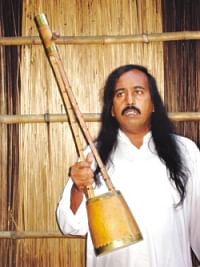In conversation with Fakir Bazlu Shah
Lives of fakirs through the eyes of a Lalon devotee
Ershad Kamol, back from Kushtia
With the death of most Lalon maestros in the country, Fakir Bazlu Shah stands apart as one of the few singers who render authentic Lalon songs. With his stentorian voice modulation he can move the audience. For the last 38 years he has been regularly performing Lalon songs at the akhra (shrine). Like other fakirs living in the congested areas of the weavers' village at Chhewria, Kushtia, Bazlu Shah's typical day is spent rendering songs and practicing some secret devotional rites. Both he and his wife have gained Khelafat many years back. Whenever local and foreign visitors come to the Lalon Academy Complex, Fakir Bazlu Shah along with other Bauls perform Lalon songs playing ektara. To quote him, "I get a share of about Taka 80 for my performances, though the visitors give thousands of Taka to the committee members of Lalon Academy Complex. This complex is run by the people who are not fakirs or Bauls, rather middlemen who make a living out of it. With the exception of Fakir Nizamuddin Shah, the current Kahdem, none of the people involved with the shrine are fakirs." Initially Bazlu was a jatra (folk theatre) artiste, from where he learnt music. Being attracted by the mysticism of Lalon songs, he became a Lalon devotee. Lalon song exponent, late Fakir Khodaboksha Shah was his guru from whom he learnt Lalon songs and devotional rites of the cult. Fakir Bazlu Shah said, "We regard Lalon songs as a spiritual expression, which is more than mere music practice. In fact, Lalon songs are the doctrines of the devotional rites of the cult. If someone practices Lalon songs like the other genres of music she or he will miss the essence of the songs. As a result, the audience will miss the real philosophy of the songs which deliver wonderful messages." At present he is one of the instructors of the Lalon Academy Complex. He is one of the 25 fakirs who get government support. Fakir Bazlu Shah has performed in different areas of Bangladesh and India.
|

Fakir Bazlu Shah |